
23 minute read
Mayors Conference
25 years of building democracy, local government in Latin America
Since the summer of 1995, each June, local and regional, as well as some national, government officials from throughout Latin America have been coming together in Miami to assess the progress being made in the building of local democracy and to develop strategies to further advance the strengthening of municipal government throughout the hemisphere as a means of both building democratic institutions and advancing the economic well-being of Latin America’s people. Sponsored by Miami-Dade County and organized by Florida International University’s Institute for Public Management & Community Service, some 500 local government leaders from throughout the hemisphere will gathered in Miami for the 25th annual interAmerican Conference of Mayors and Local Authorities. The event has become the largest annual non-political gathering of Latin Americans concerned with the building of local government. The conference kicked off with a keynote address by Luis Alberto Moreno, the president of the hemisphere’s most important multinational organization, the Inter-American Development Bank. In addition to Miami-Dade County Commissioner Javier Souto, a long time advocate of strengthening of local government throughout Latin America, conference attendees heard from an array of prominent figures from throughout the hemisphere.
JUNE 17 - 20 2019
For the past 25 years, ideas and initiatives emerging from this annual meeting have significantly influenced the actions of presidents, parliaments and regional authorities throughout Latin America in terms of the strengthening of local governments and the enhancement of their role in the construction of democratic institutions. Of particular note, the conference, in many instances. has enabled both national and international leaders to learn about the importance of strong local governments for both economic and democratic development. As the long time president of the IDB, Enrique Iglesias, frequently noted, it was through his participation in this conference that he first realized the importance of the bank working with local governments. Similarly, the conference has served as both an inspiration and a learning opportunity for those at the grass roots of democratic development. As the then mayor of Asunción, Paraguay, one of the most democratically challenged countries of the hemisphere, commented in a Miami Herald story a decade ago, “The conference is like a great supermarket of ideas for local government officials.”
Miami-Dade County Florida International University Invite You To The:
Inter-American Conference of Mayors and Local AuthoritiesXXV Building the Communities of Tomorrow: Economic Development, Resilience and Sustainability
June 17 - 20, 2019 Hilton Miami Downtown Hotel Miami, Florida USA
Allan Rosenbaum, professor of public administration and director of the Institute for Public Management and Community Service at the Green School, speaks at the Inter-American Conference of Mayors.
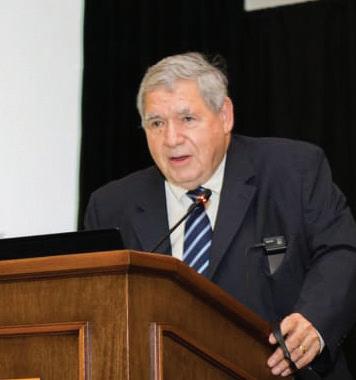
Candice Ammons-Blanfort at her commencement ceremony
First graduate of international crime and justice program researches trust in police
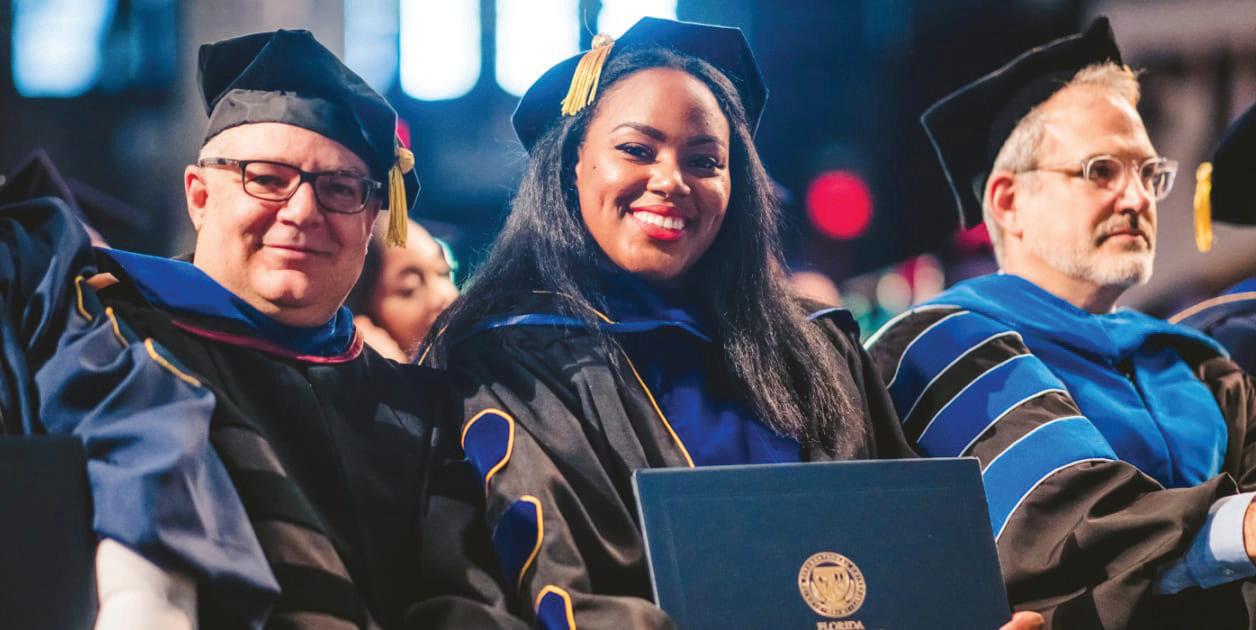
Candice Ammons-Blanfort ’19 is a champion of global perspective. If you don’t know what people in other countries are doing, how can you learn from them, she asks.
When she discovered FIU’s Ph.D. in International Crime and Justice – a new program focusing on the global aspect within the criminology and criminal justice field – she knew it was the right fit for her. AmmonsBlanfort began at FIU in the fall of 2015 as part of the program’s first class. The degree, offered through the Department of Criminology and Criminal Justice (CCJ), is one that speaks directly to FIU’s mission to provide an international education, says CCJ Chair Lisa Stolzenberg. “With its innovative specialization, the international crime and justice program prepares students for academic careers and professional life in public and private justice organizations,” Stolzenberg explains. “This degree, unlike traditional criminal justice degrees, fosters research on criminology and criminal justice from a comparative and international perspective. “Not only does this program bring in people from all over the world to think about crime from a global perspective, but it also caters to local practitioners who want to earn a doctorate degree and lead their agencies. It fits perfectly with our university’s global learning initiative.” In 2019, Ammons-Blanfort became the first student to graduate from the program. She did it in an impressive four years – all while juggling a hectic family life and giving birth to two baby boys. “It was a matter of focusing and being really determined,” she explains. “For me it really boiled down to just knowing that no matter what, I’m going to keep moving. Having faculty support also made a world of difference. I’m eternally grateful for that.” While in the program, Ammons-Blanfort conducted research on an increasingly pressing topic: the distrust of law enforcement officers by communities of color. She studied this by analyzing the level of “self-help” or “vigilante justice” – taking the law into their own hands because of distrust of police – present in black communities across the country. She found that Blacks were less likely to use firearms in areas with diverse police departments. This finding, she says, helps point to a crucial idea: people are more likely to trust law enforcement officers who look like them. This forms the basis for her future goal – to help diversify police departments as a way to help increase trust in law enforcement for communities who have a deep fear of police officers. Now a visiting instructor at FIU, she’s ready to help students – many of whom hope to one day become police officers – learn about the importance of diversity and cultural sensitivity in criminal justice. “I want my students to be able to connect what they’re learning and make it practical, so they can use it. They can change the perception of law enforcement, start to tear down those walls of division, really encourage community engagement and rebuild citizen trust.”
International relations graduate working at the World Bank in D.C.
Name: Paula Mora ’17 Hometown: Miami, Florida and Bogota, Colombia Degree/major: Bachelor’s in international relations, minor in political science Where are you working? I work at the World Bank as an IT Assistant. How did you get your job? Throughout my time at FIU, I was very involved in extracurriculars – serving as president of the Colombian Student Union (PorColombia) and treasurer of UN Women. I also had the opportunity to intern in difference sectors, starting with the Colombian-American Chamber of Commerce in 2015, Global Ties Miami in 2016, the Miami-Dade County Mayor’s Office in 2017 and finally the Port of Miami in 2017. These experiences helped pave the way to a successful journey post-graduation, as I was able to create connections and gain experience well beyond the classroom. Upon graduation and throughout my job search, my networks and my experience positioned me as a great candidate for my current role.
What was your greatest fear going into your first job and how did you face it or overcome it?
I was quite intimidated by the sheer fact that I was joining the world’s most important international development organization. I was the youngest staff member on my team and this was my first fulltime job, so the fact that I had to prove myself worthy of this role was intimidating. However, I quickly learned that everyone here is always willing to help, to mentor and to guide younger professionals navigating the institution. What surprised you the most about your first job? The impact that the World Bank has made and continues to create throughout the developing world. As an international relations student, I had read about the work of the World Bank, but one thing is reading it and another is being in the midst of where it all takes place. Being surrounded by passionate people who want to make this world a better place has been my favorite discovery through this journey. What advice do you have for those beginning the job search process? Internships, internships, internships! I cannot stress enough the importance of internships. The classroom provides excellent tools, but it is out there in the real world where you are able to actually get a feel of what each sector has to offer – internships allow you to take a “test drive” and decide for yourself where it is that you see yourself making an impact. What does a day on the job look like? In my specific role I assist the IT Governance team in program delivery; this includes managing IT project approval processes, including project quality assurance, maintenance and approval of project workflows, and tracking and reporting on project status. In a few words, project management is at the top of the to-do list. How does your job connect back to your coursework? Although I currently work in the information technology department, my studies in international relations provided me with the context of why the work of the World Bank matters at a global scale. Knowing that even as an assistant I can contribute to the mission of the World Bank has been the most rewarding aspect of my job. What’s been the coolest thing about your job so far? The coolest thing about working in the World Bank has been having the opportunity to participate in World Bank annual meetings – where leaders from all around the world and experts from various sectors meet to discuss the current state of the sustainable development goals, and how we can create a world free of poverty.
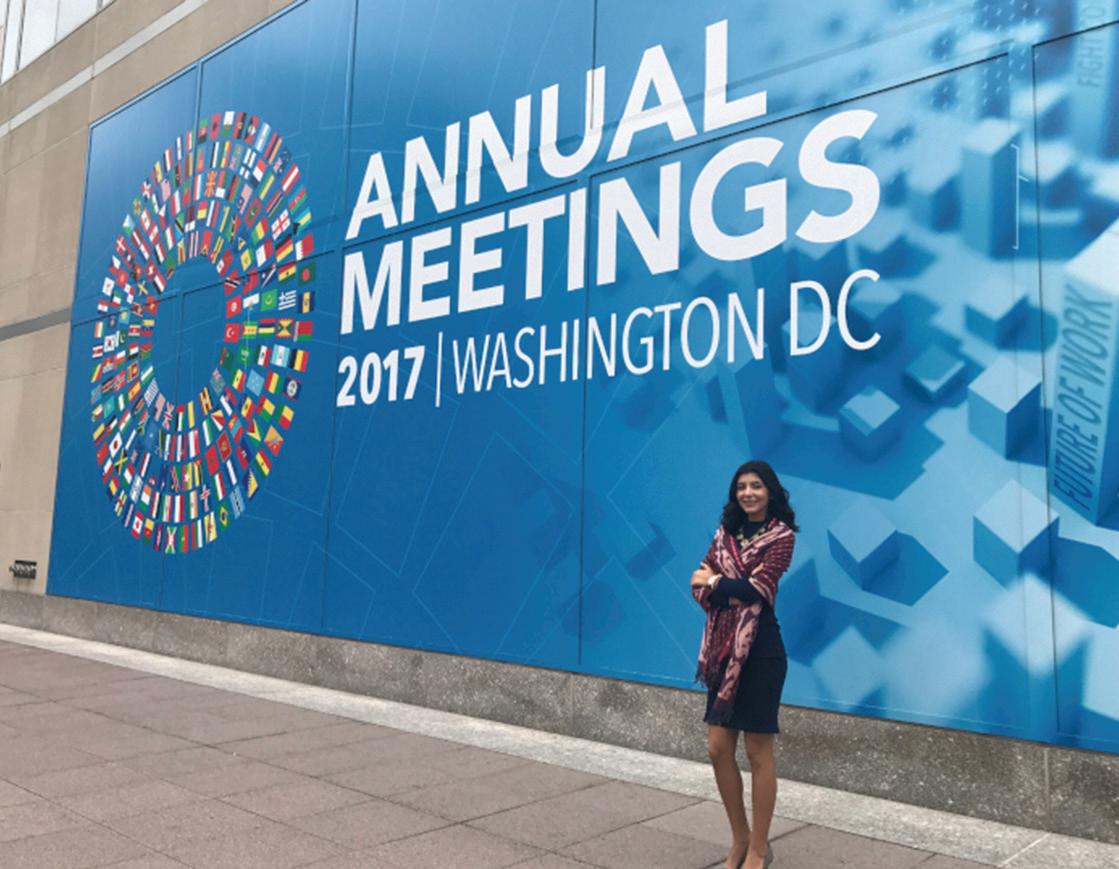
Paula Mora turned her extensive internship experience as an undergraduate in international relations into a first job with the World Bank in Washington, D.C.
Working as a staff assistant for Congresswoman Donna Shalala
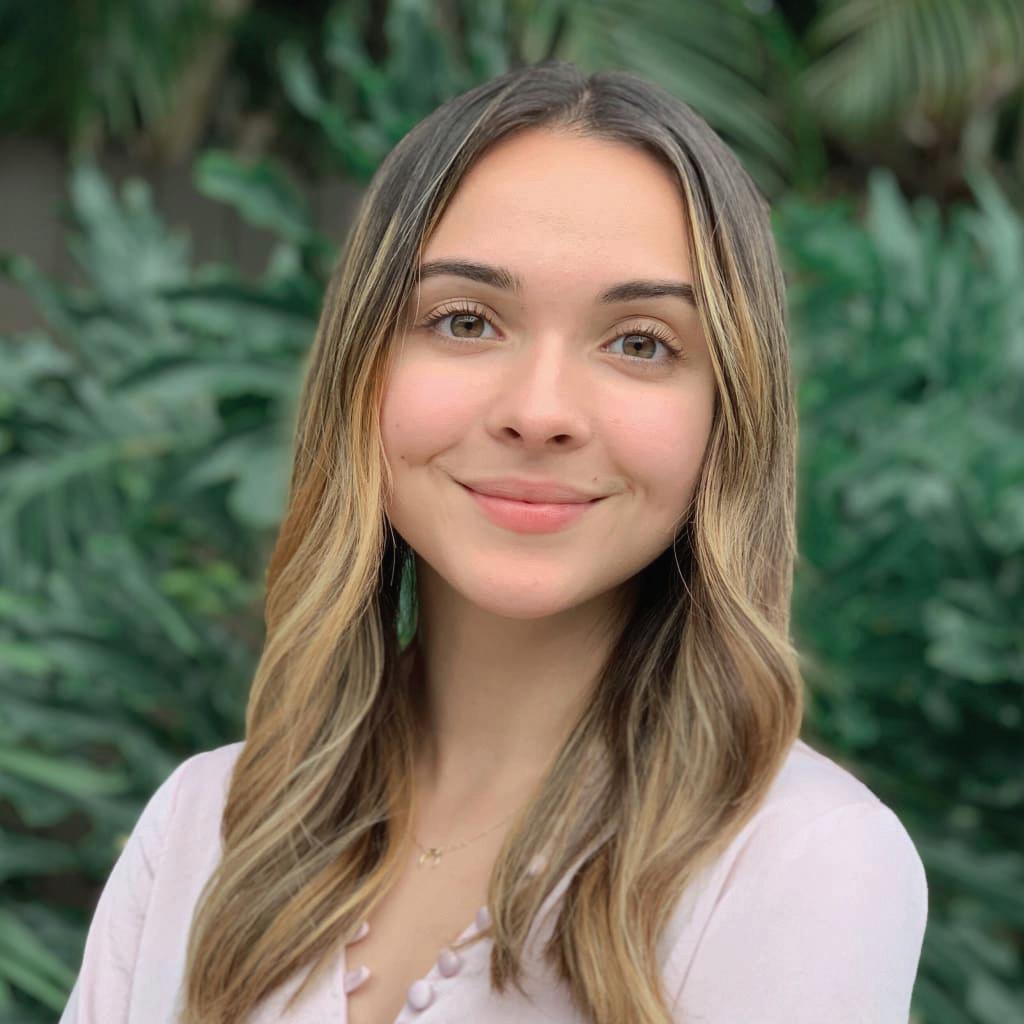
Name: Diana Garcia Hometown: Pembroke Pines, Florida Degree/Major: International relations and philosophy Where are you working? I work as a staff assistant at the U.S. House of Representatives in the District Office of Congresswoman Donna Shalala (FL-27). How did you get your job? I began interning at Congresswoman Donna Shalala’s district office in January as part of an Honors College course. I was taking “How to Change the World” with Professor Rosado, and we were required to complete an internship as part of the course. After finishing my internship, I was asked to join the team permanently.
What was your greatest fear going into your first job, and how did you face it or overcome it?
My greatest fear going into this job was that I would not have had enough prior professional experience. Luckily, my Honors College classes at FIU prepared me for this role more than I had initially realized. The Honors College’s focus on interdisciplinary learning, writing and research have been my biggest asset in this new role. What surprised you the most about your first job? What surprised me the most about my first job is how important people and communication skills are. I went into the role worried about my ability to complete certain tasks and found that one of my greatest assets is the ability to listen and communicate. What advice do you have for those beginning the job search process? Do not be afraid to reach out and ask for help! Honors College Career Services advisor Isabel Green and professor Ralph Rosado were so vital in this process for me. As a friend once said to me: “Life begins at the end of your comfort zone.” So don’t be afraid to put yourself out there and experience new things. What does a day on the job look like? Every day is different but as the office’s staff sssistant my role is to support all members of the staff in any way I can. This usually means working closely with our district director, caseworkers and outreach coordinators to make sure that we support Florida District 27 and our constituents in the best and most efficient way we can. How does your job connect back to your coursework? As an Honors College student double majoring in international relations and philosophy, I’m constantly challenged to think critically and problem solve. Working in a congressional office requires me to use my knowledge of politics, social issues and organization daily. What’s been the coolest thing about your job so far? My favorite part of the job is getting to hear from and interact with our constituents. It’s really cool to be able to see someone come in with a problem or concern and see the office be able to help them find a solution. I really love the office I work in and am lucky to be surrounded by such supportive colleagues.
Internship helps Green School grad land job at Adobe
Alumnus Jose Andres Camacho ‘17 reflects on his internship experience and how the skills he gained helped him land a job at Adobe.
my experience with The Washington Center . At the end of it, I asked her if she would be open to being my mentor, and she accepted. That’s basically where everything changed for me. What did you major in? I majored in international relations What were some of the skills you learned at your and pursued a certificate in national security studies. internship that you are still benefiting from now? I think Where are you working? Title? I work for Adobe as a it’s both the hard and soft skills I developed. At my internship social media enablement specialist. site, I learned hard skills like how to make editorial calendars for social media and how to plan social media posts for big Where did you intern while in D.C.? My internship was in events. For example, CHCI hosts a big annual gala and the Fall 2016. I was the marketing and communications intern year I was there we had with the Congressional former Secretary of State Hispanic Caucus Institute Hillary Clinton and then(CHCI). President Barack Obama What is the most as speakers. My role was significant takeaway to capture all that was from your internship going on that night for experience that is the organization’s social still affecting your life media. I employed the today? A key part of social media management my (Washington Center) and Adobe Photoshop Academic Internship skills that I had learned at Program was the my internship site to post informational interviews on CHCI’s social channels. assignment. We had to conduct informational interviews with two people outside of our internship site network that we found inspiring or that we wanted to learn more about. We had to step beyond our comfort zone. My interviews were with the Policy Advisor for the FEMA Administrator and Jose Andres Camacho ‘17 capitalized on his internship experience in D.C. to land a social media job at Adobe. I also demonstrated the soft skills I had been picking up and refining during the semester. Working that event, I benefited from knowing how to work within a team, how to communicate with other teams’ manager and how to acclimate to different working styles for the greater goal. the Policy Lead for the White House’s Precision Management What made you realize you needed to do an internship Initiative. Doing these interviews made me aware of how while you were in school? Because I was studying to network. international relations, I wanted to make the most of my These networking skills would prove immensely valuable when I returned to school. An acquaintance of mine announced on LinkedIn that she was being promoted to the main headquarters at Microsoft. This is where my education and take the opportunity to study abroad at some point in my college career. To me, abroad doesn’t have to mean outside the country. I thought, “How can I study international relations and not study ‘internationally’?” (Washington Center) experience kicked in. I immediately D.C. is a city full of leaders, where decisions are made on commented, “Congratulations, I’d love a chance to meet an international scale. When a Washington Center recruiter and talk about how you got to where you are today if you came to my campus to speak about the internship program have time.” She sent a direct message back, inviting me over and the opportunities it afforded in Washington, I felt as if to her place where she was already packing up to move. We my next step was right there in front of me. It felt like the talked for two hours about her work experience, and I shared obvious solution to my study abroad questions.
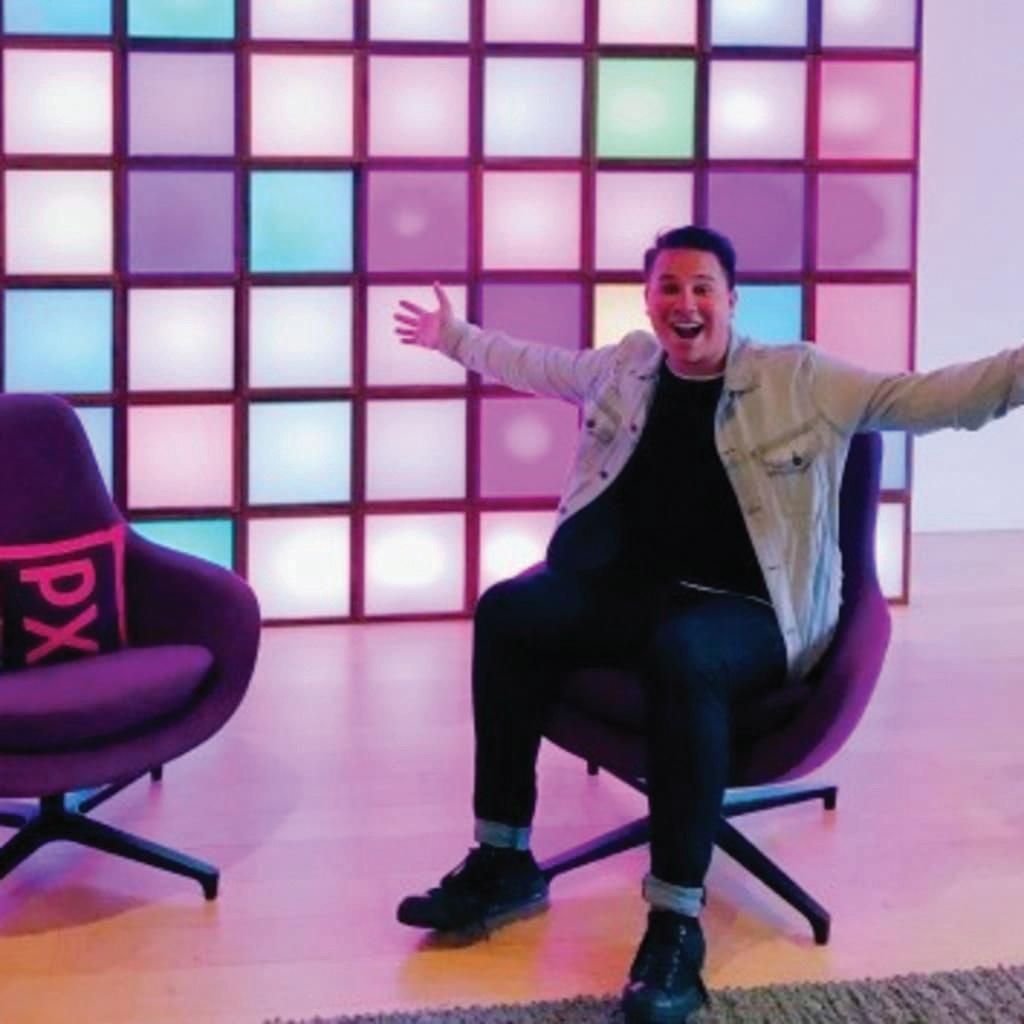

National Science Foundation awards FIU $1 million to train policy professionals in cyberinfrastructure
The National Science Foundation (NSF) awarded FIU a $1 million grant to train policy scientists in infrastructure to help meet the demand for professionals with an in-depth understanding of the latest technologies. “This is a great collaboration that melds science, technology and public policy,” said Howard Frank, director of the Jorge M. Pérez Metropolitan Center, which houses the training program. “It combines the technological side of security with the human and organizational side of the enterprise, through public policy and administration.” This award will jumpstart a new era of public policy practice and research, according to the grant’s lead investigator, Sukumar Ganapati, from FIU’s Department of Public Policy & Administration. The grant will enable the creation of Daylong training workshops for local government policy makers and professionals, and also local nonprofits. It will also create a policy informatics certificate for Master of Public Administration (MPA) students through the Department of Public Policy & Administration. “The target audience is senior management in local government and nonprofits,” said Frank, who also chairs the Department of Public Policy and Administration. “Many of our students are ‘adult learners’ in that sector, making this a perfect fit for them.” The skills acquired through this training will also benefit low-income communities as it will provide them with the same access to resources that highincome communities have. As a Hispanic-Serving Institution (HSI) located in Miami, FIU is well suited to implement this grant. The collaboration includes FIU’s Metropolitan Center, the Department of Public Policy and Administration, the School of Computing and Information Sciences and the School of Electrical, Computer and Enterprise Engineering both within the College of Engineering & Computing. The collaborators are part of Cybersecurity@FIU, an emerging preeminent program that focuses on digital defense and protection issues that impact the global landscape and examines complex human and social questions related to privacy policies and trust.
NICE Conference reaches new heights
The 2019 National Initiative for Cybersecurity Education (NICE) Conference and Expo in Phoenix marked the event’s 10-year anniversary. Hosted by the Jack D. Gordon Institute for Public Policy and the Division of Information Technology at Florida International University, along with New America and Arizona State University, the conference hit record-breaking numbers with over 800 attendees, 40 professional exhibitors and over 30 presentations. The conference is hosted by FIU as part of Cybersecurity@FIU, an emerging preeminent program. The NICE Conference brings together thought leaders from industry, government, academia and nonprofit organizations to address the community’s cybersecurity education, training and workforce needs. Students, industry professionals, educators and policymakers are encouraged to attend as it provides an opportunity to share best practices from around the world and across sectors in order to build the workforce we need to confront cybersecurity risks today and in years to come. “We’re incredibly pleased at the growth we have had since leading the conference in 2018 and our ability to reach underrepresented communities,” said Randy Pestana, assistant director of the Gordon Institute, part of the Green School, and conference coordinator. “We’re also grateful for the support of industry partners that have helped advanced the conversation on how best to tackle the 500,000 cybersecurity workforce shortage.” The 2020 NICE Conference is scheduled for Nov. 16-18 and will be held virtually. The theme is New Decade, New Solutions: Meaningful Actions for an Evolving Cybersecurity Workforce. “Last year NICE celebrated its 10th annual conference and as we look forward to the next decade and beyond, we want to be known as an action-oriented community,” said Rodney Petersen, director of NICE at the National Institute of Standards and Technology in the U.S. Department of Commerce. “Therefore, we are excited to engage with community members from industry, academia, and government this Fall to learn about creative and innovative solutions that will create a future where employers find
Brian Fonseca delivers welcome address at NICE Conference in November 2019.
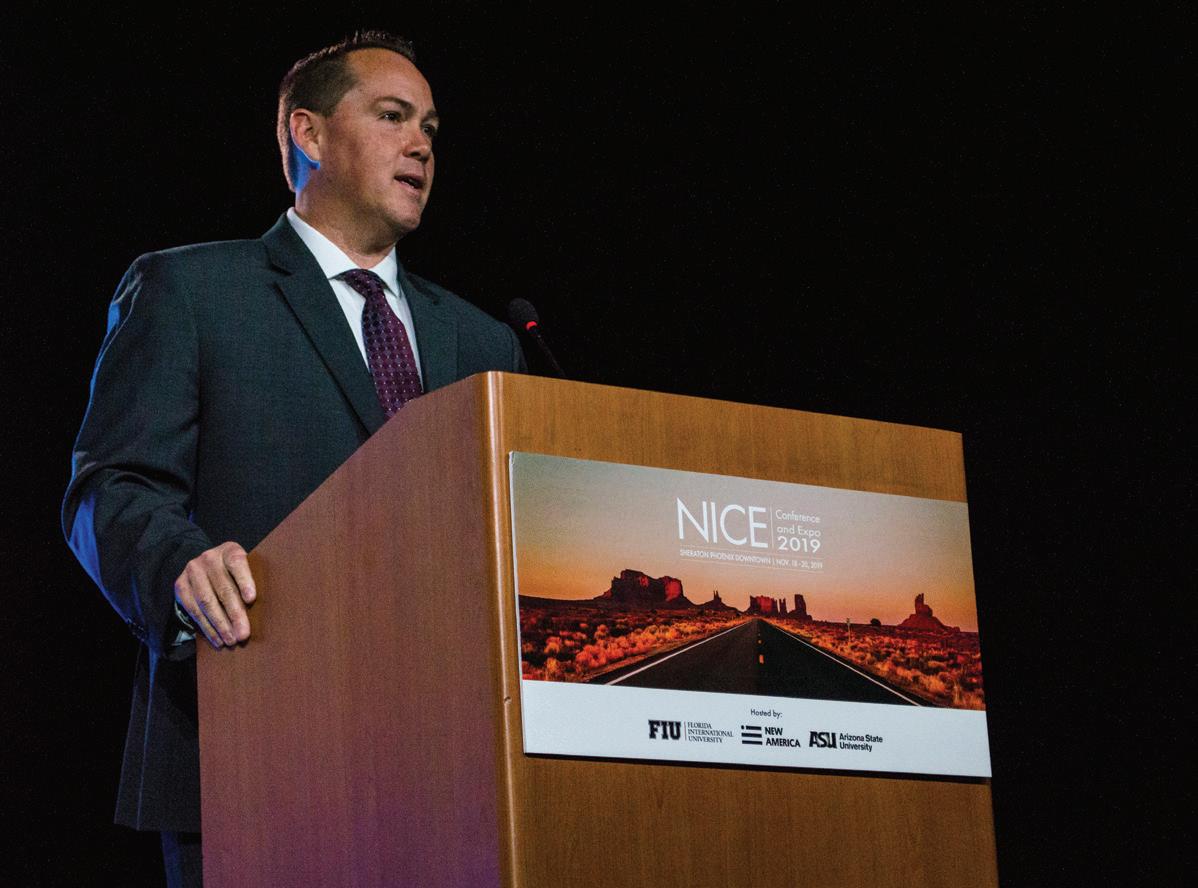
the skilled cybersecurity workforce that they need to manage their enterprise cybersecurity risks.” The event is supported by the National Initiative for Cybersecurity Education (NICE), a program of the National Institute of Standards and Technology in the U.S. Department of Commerce, under NIST Financial Assistance. This will be FIU’s third year as host in a fiveyear cooperative agreement with NICE. To register, inquire about sponsorships or for more information, please visit www.niceconference.org.
–Randy Pestana, assistant director of the Gordon Institute
FIU booth at 2019 NICE Conference
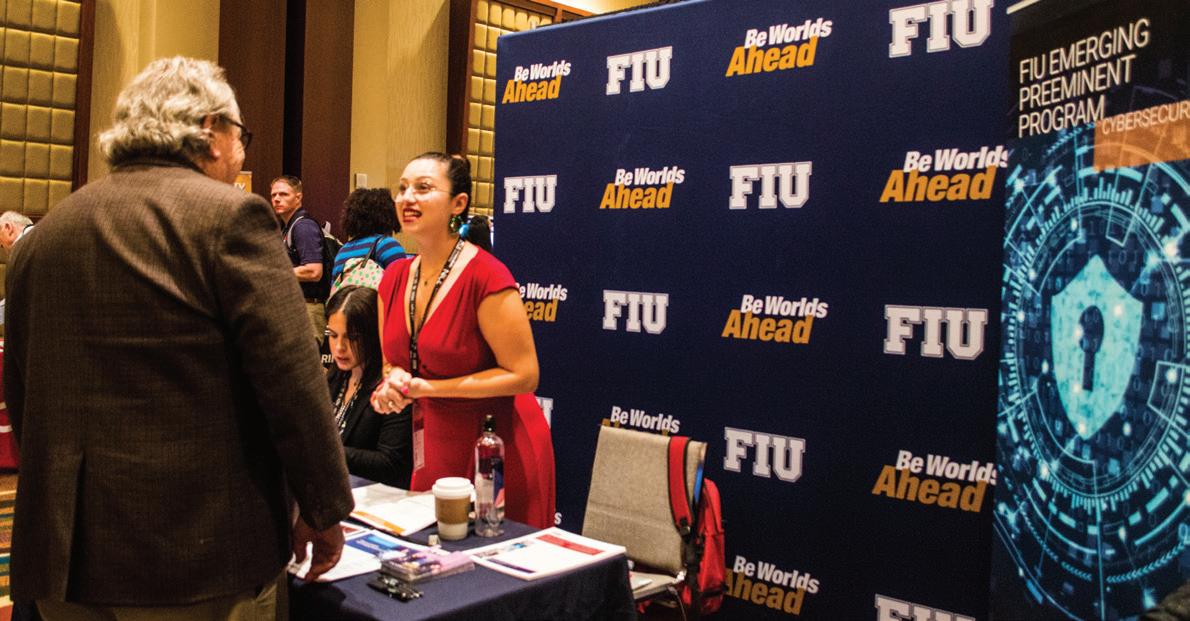
USAID awards FIU $4.2 million to reduce disaster risks in Latin America and the Caribbean
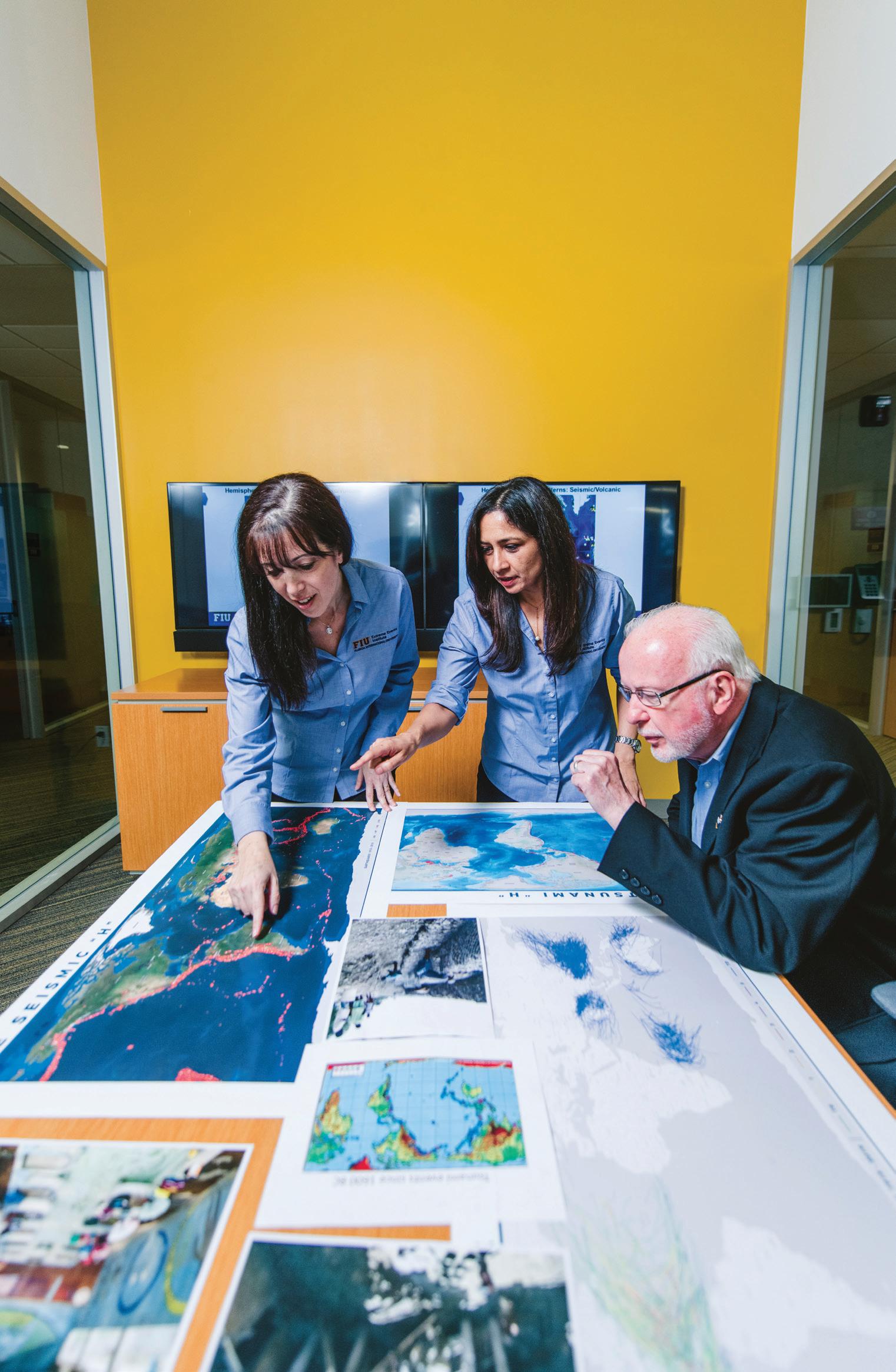
From left to right: Gabriela Hoberman, assistant director of the Extreme Events Institute (EEI); Meenakshi Jerath, Ph.D. student from the FIU Department of Earth and Environment; Richard Olson, director of EEI and professor in the Department of Politics and International Relations. The United States Agency for International Development, Office of U.S. Foreign Disaster Assistance (USAID-OFDA) has awarded a $4.2 million, three-year cooperative agreement to the FIU Extreme Events Institute (EEI) Disaster Risk and Resilience in the Americas program (DRRA).
The program will focus on disaster risk reduction in Latin America and the Caribbean, providing advanced training to higher education faculty and practitioners that will prepare them to help their communities by reducing existing risks, as well as identifying and confronting the driving forces that are creating new risks on an almost daily basis. The training will teach participants about numerical risk modeling and its practical applications.
The program will address risks from multiple hazards, including earthquakes, tropical cyclones, landslides, floods and droughts, but will be particularly sensitive to risks posed by the increasing magnitudes and frequencies of hydrometeorological events, such as hurricanes, storms and floods, which are of major concern to many communities in the region. The program’s goal is to help communities reduce vulnerabilities, better manage risk and build long-term resilience – taking at least some pressures off emergency response, relief and recovery organizations, which are often overburdened and highly stressed.
“There are no such things as ‘natural’ disasters, as hazard events only become disasters when they interact with our human exposures and vulnerabilities, and those derive from choices our societies make, or don’t make,” said Richard Olson, EEI director. “The DRRA program tackles that problem head-on with knowledge, techniques and assistance.”
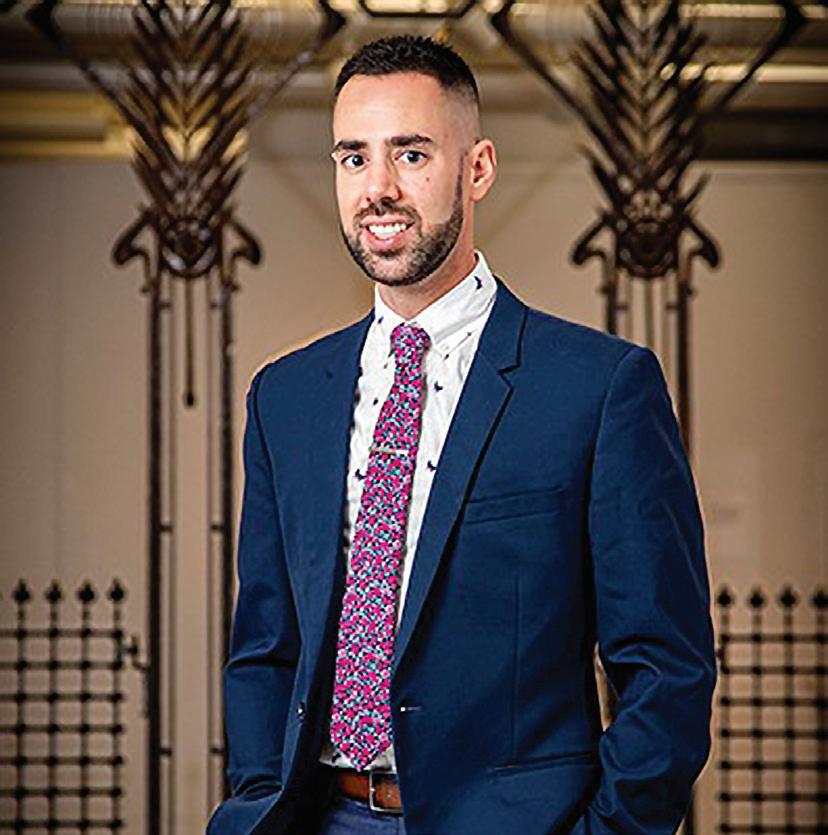
Julio Capó Jr.
Deputy Director, Wolfsonian Public Humanities Lab
Department of History
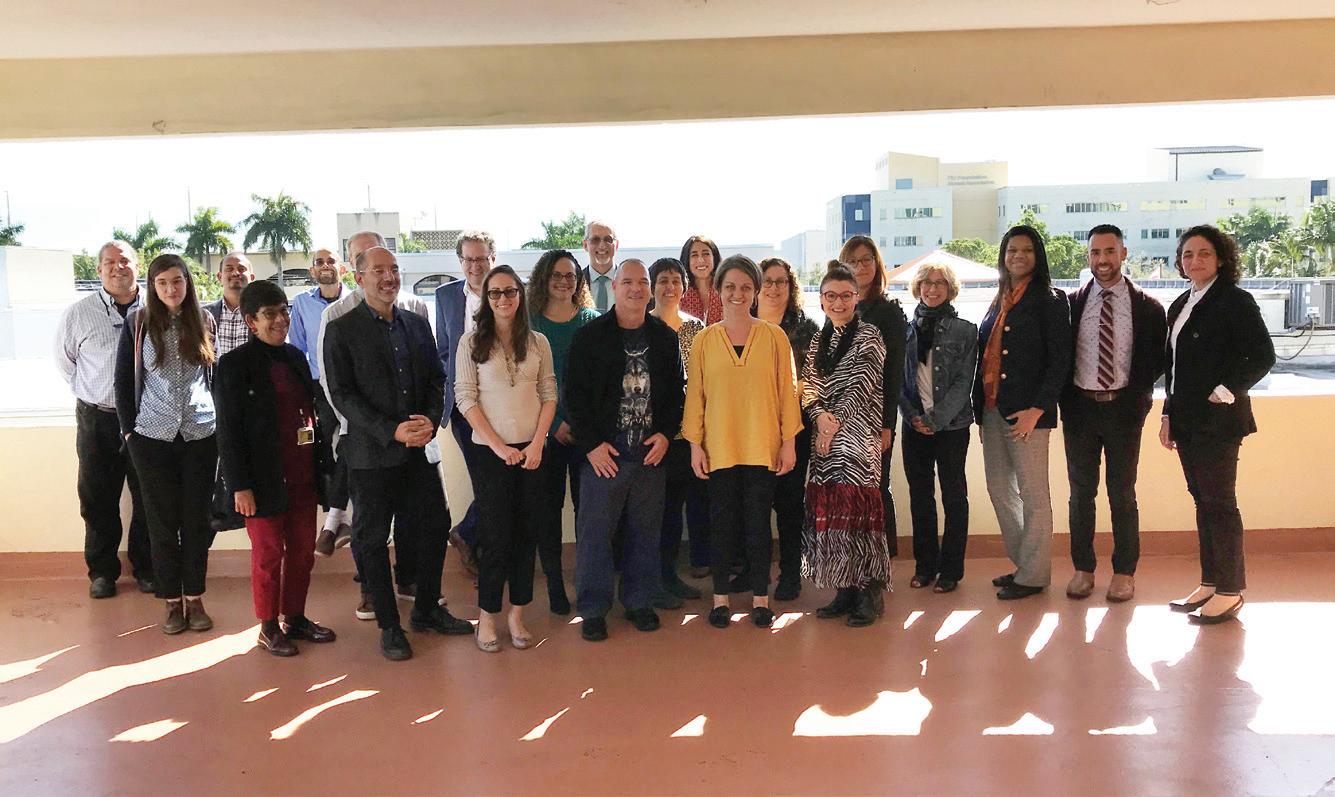
The Wolfsonian Public Humanties Lab hosted its first faculty development seminar with The Humanities Edge in 2019.
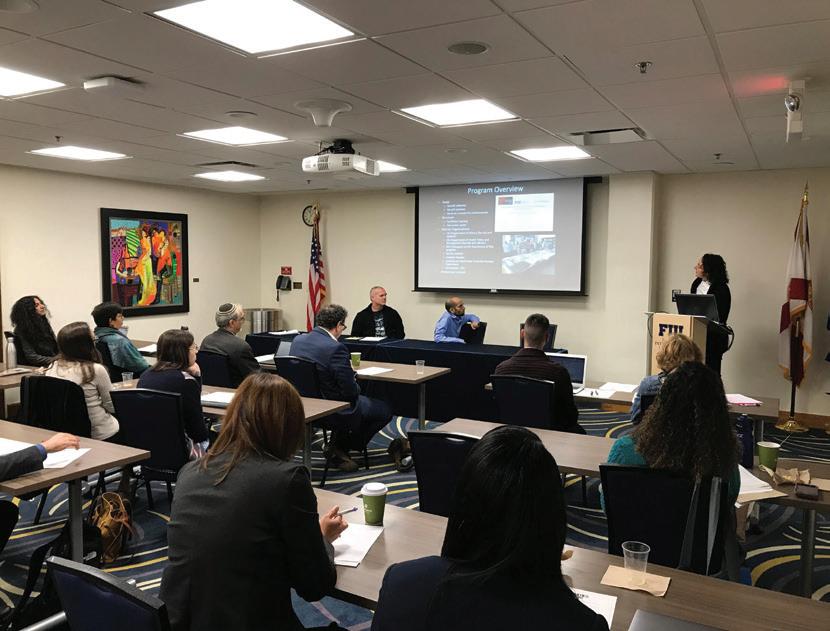
The 2018-2019 academic year was a building time for the Wolfsonian Public Humanities Lab, an Emerging Preeminent Program at FIU. The program hired its first faculty member, Julio Capó, an associate professor of history and public humanities, along with two graduate assistants, supported by the Green School.
In April 2019, the program hosted the Inaugural Public Humanities Lab Symposium with over 60 attendees. In November 2019, it co-hosted, with The Humanities Edge, a Public Humanities Faculty Development Day attended by over 30 faculty from FIU and Miami- Dade College.
The Vulnerable Landscapes Research Group was organized with colleagues from across the university in the humanities, social sciences, natural sciences and the arts. Another collaborative research team was organized to solidify a partnership with the Museum of Graffiti in Wynwood.
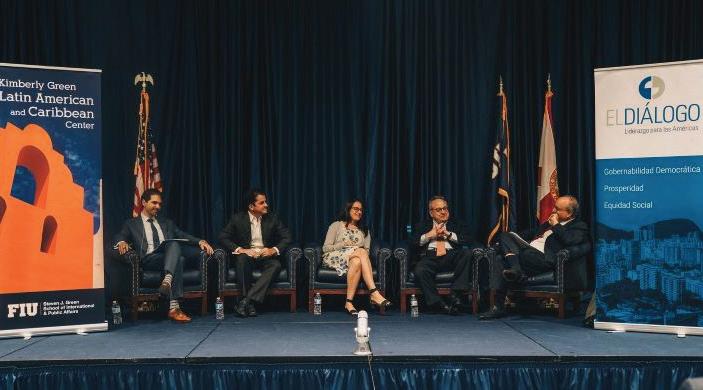
From left to right: Michael Camilleri of the Inter-American Dialogue; Venezuelan author Raul Stolk; Tamara Taraciuk of Human Rights Watch; Michael Shifter of IAD; and Frank Mora, former director of the Kimberly Green Latin American and Caribbean Center.
LACC hosts Venezuela report launch
As the crisis in Venezuela dominated headlines last year, a team of prominent policy experts from the region came to FIU to unveil a new report on what course of action by the United States and others could help bring about peace.
The report – prepared by the Venezuela Working Group of the Inter-American Dialogue, a leading foreign policy think tank that focuses on the Western Hemisphere – concluded that peaceful, democratic transition in Venezuela is possible – but far from guaranteed. “In a nutshell, the democratic transition which is urgently needed is possible but not inevitable,” said Michael Camilleri, director of the Peter D. Bell Rule of Law Program at the IAD and author of the report. “There are massive vacuums of state authority combined with criminal activity. It’s an extremely toxic brew. The trajectory is clear: this is a deepening humanitarian crisis.” Camilleri traveled to Miami from Washington, D.C., with IAD President Michael Shifter to present the Venezuela report and discuss its findings with students at an event hosted by the Kimberly Green Latin American and Caribbean Center. Former LACC Director Frank Mora, who worked with Camilleri when Mora was the U.S. deputy assistant secretary of defense for the Western Hemisphere under President Obama, moderated the discussion. “They approached us because they wanted to do an event in Miami,’’ Mora explained, noting both the proximity to Latin America and the Caribbean, as well as the large Venezuelan population that lives in South Florida. “Many of these groups like to bring their findings to Miami.” Launching the Venezuela report in Miami and in partnership with FIU represented “a tremendous opportunity to advance our mission and engage new stakeholders,” added Camilleri. “South Florida is a crossroads for Latin Americafocused policymakers, academics and media, and home to important diaspora communities from Venezuela and elsewhere in the region,” he said. “In this context, FIU and LACC stand out as a unique convening ground and as a center for consistently excellent, policy-relevant scholarship.” For students, Mora said events like these “bring the think tank world” to the university and give students a rare opportunity to interact with and ask questions of high-level policymakers who are experts in foreign policy and international relations. “It exposes them to the work and people that work at D.C. think tanks,’’ he said. “The purpose of (the IAD’s) work is to influence policymakers. The report presented (at FIU) will be sure to have some influence on policy discussion within different agencies of the U.S. government.” It’s the second time in the past several months that a major international organization has chosen to present new information on Latin America and the Caribbean at FIU. In February, “Acts of Violence in Nicaragua,’’ a report commissioned by the Inter-American Commission on Human Rights and banned by the government of Daniel Ortega, was also unveiled at a LACC event. Both the Americas director of Amnesty International and the former attorney general of Guatemala, now a human rights attorney, participated in that event, which was moderated by FIU professor and former Costa Rican President Luis Guillermo Solís. Adam Ratzlaff, a doctoral student in international relations, said these kinds of activities make FIU and LACC stand out. “Hosting events with scholars and policymakers on issues of importance to the region allows students to gain a deeper understanding of an array of topics … and develop the professional connections that may help students determine what they want to do following graduation,’’ he said. “Not only does FIU have an abundance of inhouse expertise on these issues, but its location in Miami and the events that the university hosts allow students to learn from some of the top minds in the field.”










